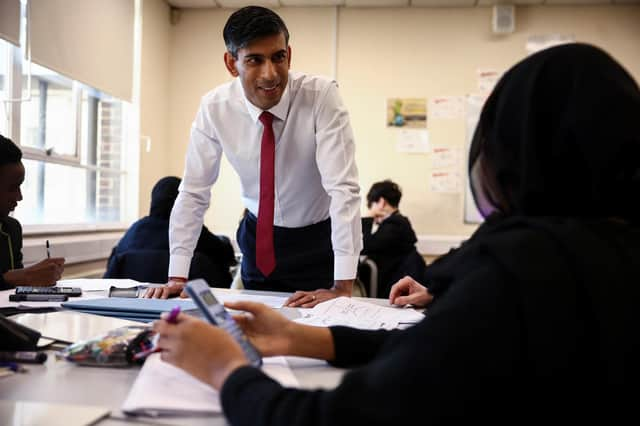Rishi Sunak's plan for more maths doesn't add up. Just ask a maths teacher – Cameron Wyllie


I got my Higher maths after a sustained campaign by my teacher, a funny, clever man who had been wounded in the war, and my mother, the former using his professional skills and the latter using fear. I also have a great deal of respect for maths teachers, of whom I have known and liked many. A great maths teacher has a value far beyond pearls, and great maths teachers (and all the rest of them) know precisely why the idea of making everyone do maths to age 18 is ridiculous. The Prime Minister has dug up this old chestnut and is presenting it again to us to groans of disbelief from the teaching profession.
Now, obviously, education is devolved, so what Mr Sunak thinks or does is, in this instance, irrelevant to Scottish schools; actually, the last policy document produced by the Scottish Conservatives, ‘Curriculum For All’, though patchy contained some sensible ideas, so one hopes that Douglas Ross and Stephen Kerr won’t rush onto this particular bandwagon, because it’s going nowhere.
Advertisement
Hide AdAdvertisement
Hide AdA long time ago I taught a brilliant boy, a genius at history and English and classics, with an old-fashioned manner not unlike that of Jacob Rees-Mogg, except this boy was kind and humane and had a vague connection with the Planet Earth. He could not do maths at all, and, as he faced doing Standard Grade maths for the third time in S6, along with four advanced exams, it was necessary for me to phone the ancient and excellent Scottish university which he hoped to attend to persuade them to let him in without a qualification in maths. Which they did, fortunately.
You see, some people just can’t do maths. With, say, English, young people can incrementally improve, but years of experience tell me that, with maths, many of them just reach a limit which they can’t get past; beyond this, the subject is a hellhole for them, and it’s a hellhole which they need not ever enter. Maths teachers know this, but Rishi Sunak, who was, I imagine, rather good at maths, does not.
Of course, apart from anything else, the practical implications of Mr Sunak’s desperate policy are staggering. Where are all these new maths teachers coming from? Is it even possible to timetable classes for everybody, and, if schools can do that, what is it that young people are not learning in order to make way for more maths? Such a policy is destined to erode even further the teaching of ‘minority’ subjects like drama or media studies or art (“wastes of time” grunt retired colonels of Cheltenham) in order to further torture innumerate children and make schools seem even less relevant to their lives.
What about the attendance officers necessary to force these kids into school? What about the effects on the (already precarious) mental health of young people having to face failure in something they don’t want to do? Does any politician these days, whether in Scotland or the UK, actually listen to actual classroom teachers and heads before they sound off with yet another impromptu policy rap? Children deserve something better than soundbites.
Of course, across the UK, it’s right for politicians to be saying we need to focus more on STEM subjects (science, technology, engineering and mathematics) because we are rapidly falling behind other countries and we need to do better. I say this remembering, of course, that while a central purpose of education is to prepare young people for further study and/or the workplace, it isn’t the sole purpose.
But surely the way forward is to invest in better equipment, better facilities and more teaching in all these areas for the young people who are actually good at them. A persistent failure of state education, largely due to the lack of time and resources rather than will, is in the stretching of the most able students. Instead of making the least mathematically able children struggle on with the subject for years, why not nourish the capabilities and ambitions of our most able young scientists, engineers and mathematicians, so we produce the best in the world? That would be a good use of limited resources.
Education across the UK is in a troubling place, and it needs to be a much more prominent political priority. Among the many things necessary to improve it is an expansion of the opportunities necessary to allow our young people, regardless of their academic ability, to excel at what they are good at; a fairly significant chunk of them aren’t going to shine in maths and science, but they might well be brilliant at something not yet even on the school curriculum.
We need to be creative in our thinking about the future of our young people, not simply content ourselves with rehashing old ideas. Many of our children are troubled by the uncertainties, all the way from the personal to the global, of their futures. Adding extra trigonometry and calculus into the complex equations of their lives is not a way forward.
Cameron Wyllie writes a blog called A House in Joppa. His book, ‘Is There A Pigeon in the Room? My Life in Schools’ is published by Birlinn
Comments
Want to join the conversation? Please or to comment on this article.